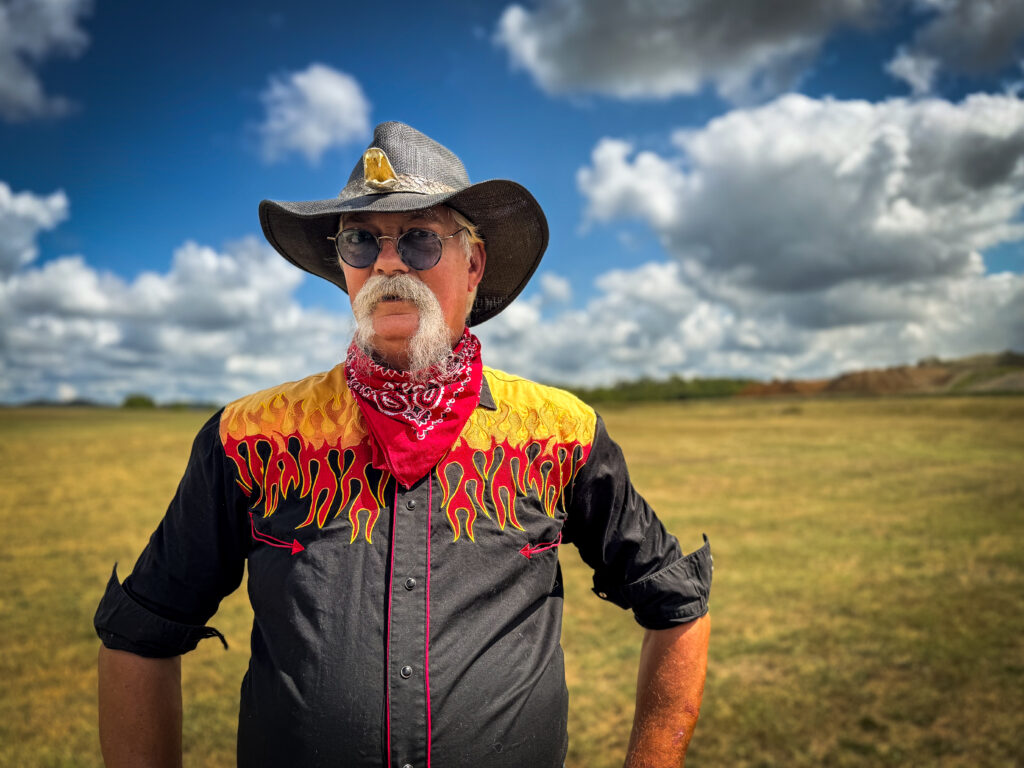
The first time I saw Rick Laude, it was 2019. He’s alone in a field outside Riverbend Maximum Security Institution. In contrast to the maybe four dozen or more vigil attendees in the “against” side during Donnie Johnson’s execution, Laude has his hands on his hips on the other side of the fence — by himself — supporting the execution.
But even in a crowd, he’d be hard to miss.
Laude is tall. He wears jeans, a long mustache, cowboy boots and, in cold weather, he adds a trench coat. Any time of year, you’re likely to see him in a cowboy hat with a rattlesnake wrapped around it — fangs dripping venom.
Across the fences and fields that separate the “for” and “against” camps the only thing I heard from him after Johnson’s execution was a shouted “thank you Governor Lee!”
‘Guardian angles … do exist’
At Byron Black’s execution Tuesday morning, his thoughts are biting.
“Today we’re gonna wipe the smile off of Byron Black’s face,” he says, “you know, he’s a disgrace. He’s gonna get what he deserves.”
This execution, Laude is actually not alone on his side of the fence. Remembering victims Angela Clay and her young daughters, Latoya and Lakeisha, are four cousins. One lowers her head and quietly says, “well, once we get a word, that’s it. God’s will is done. End of a chapter.”
Victims’ family members like these women are at least one reason Laude has stood his own kind of vigil at the prison during about 10 executions since 2009. He’s particularly angry about crimes involving children and tells me there’s a big reason for that.
Timeline: The death penalty in Tennessee
“I was almost murdered in Madison, Tennessee, on Christmas Eve of 1971 by my stepmother,” he says, “she found out that our father had moved in with his secretary and he wasn’t coming back for anybody, so she decided to give him a Christmas present he would never forget.”
Laude says his stepmother pulled out his father’s revolver, pointed it at him and kept pulling the trigger. When she realized the gun was not loaded, he says his stepmother left the room to try and load the gun, but couldn’t figure it out.
“ That is when I first realized that guardian angels more than likely do exist,” he says, “and if it wasn’t for her failing to figure out how to unlock the cylinder, I would be dead.”
Laude says he’s never been the same, and he relates to the two girls killed by Byron Black. “I know what it’s like to have a gun pointed at you when you’re a child and see the trigger get pulled.”
‘Be civil’
In the past, he’s dressed up as a priest to mock the actual clergy holding vigil on the other side. For Billy Irick’s execution in 2018, he even dragged a speaker out to blast AC/DC’s “Hells Bells” at the protesting death penalty abolitionists.
Even so, after Black’s execution Laude meets and shakes hands with a few clergy — and he’s still talking with one pastor long after nearly everyone else has left. Prison guards even give them a gentle 15-minute warning that they need to wrap it up and leave the property.
Issues around the death penalty are complex and deeply emotional, and even though Laude has always stood on the pro-death penalty side of the fence, he tells me he has many major concerns about the punishment. Unprompted, he calls it a flawed system and says innocent people have at least occasionally been executed. He even questions whether it’s a sentence that should ever be handed down again.
“Just because somebody is anti-death penalty and pro-death penalty doesn’t mean that we can’t sit down and be civil to each other and see if we can’t figure out a solution,” he says. “It’s not fair to that family standing behind you. They had to wait 36 years for justice to be served.”
This scene was part of the August 7, 2025 episode of This Is Nashville on current state and federal events.

